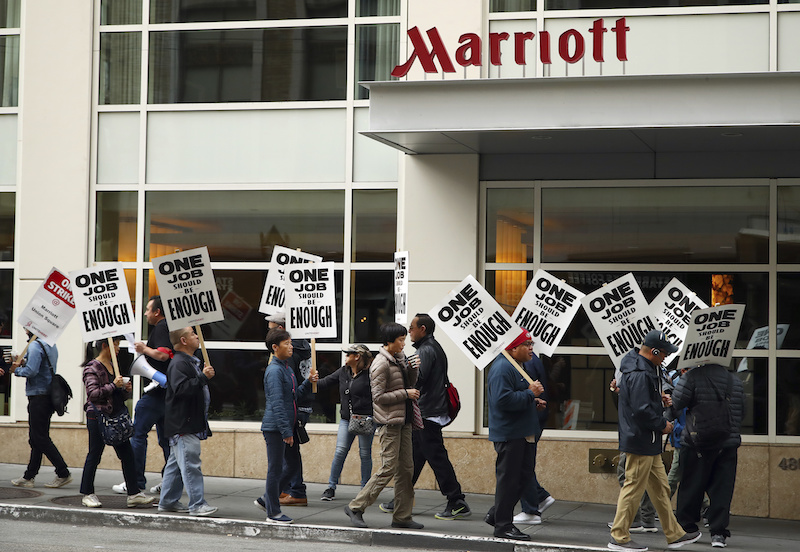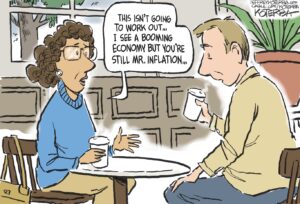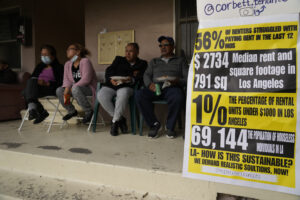How Marriott’s Credit Union Swindles Its Low-Wage Workers
Unusually high fees on interest rates and loans add insult to injury for hourly hotel workers. Marriott workers strike in San Francisco. (Ben Margot/AP)
Marriott workers strike in San Francisco. (Ben Margot/AP)
As approximately 8,000 Marriott workers nationwide enter their second month on strike, protesting poor labor practices, some employees are speaking out about how the Marriott Employees’ Federal Credit Union exploits their hardship.
“The money gets into my account, and they take it out when I overdraft,” Amos Troyah, a dishwasher at a Philadelphia Marriott, told The New York Times. “They are robbing me.”
In 12 months, Troyah made $30,000 and paid $2,000 in fees to the credit union.
Last week, Marriott employees filed a class action lawsuit in Philadelphia over charges on loans that were previously undisclosed at the credit union, which is officially independent, though its leadership is made up of Marriott executives.
Workers pay a $35 fee to apply for a loan of up to $500 for six months. Often, the borrowers do not realize that these loans have an annual interest rate of 40 to 50 percent. The lawsuit states that Marriott’s human resources departments markets these loans to workers who are unaware of costs, which include a $10 weekly deduction straight from their Marriott paycheck.
“While the mini-loan may appear to be a free-standing financial product, it is part-and-parcel of the unequal bargaining relationship between the Marriott and its employees. By providing employees with quick cash when needed and indebting them to their employer, the mini-loan allows the Marriott to retain its workforce while subjecting workers to unfair and unpredictable scheduling practices,” the lawsuit argues.
The credit union also charges $35 for an overdraft and fees of around $6 and $10 when an account goes below a specified balance or a person carries out too many transactions. Fees make up an unusually high amount of the credit union’s $188 million assets, at 1.7 percent. According to a federal regulatory agency, fees on loans at the Marriott credit union are unusually high: $11 for every $100.
These fees can add hardship for workers who are already in tough financial situations. “As the largest employer in hospitality, they’re in a position where they could really step forward and try to do right by their employees,” said Lisa Correa, a worker at the Marriott Marquis in San Francisco. “They continue to find ways to downsize the workforce, adding to our workload, and they’re doing whatever they can to not pay medical.”
According to The Nation, the credit union exploits people of color, who are less likely than the rest of the population to have savings, due to unequal access to wealth. If a person then takes out a predatory loan, he or she is likely to become even more reliant on lenders. The Nation also points out that this practice has roots in the racism of the post-Civil War South:
The combination of predatory lending and predatory-employment practices has a historical precedent in the sharecropping system that kept formerly enslaved black families in the South trapped in a cycle of debt. Since most sharecroppers did not have a steady cash flow, they used their prospective crops as collateral to finance loans from the country store, a merchant who faced little competition and could therefore set interest rates as high as 50 or 60 percent. White store merchants and landlords built their own wealth on a system that left predominantly black sharecroppers in perpetual debt.
On its website, Marriott’s credit union states: “Unlike most banks, credit unions focus on individuals, not larger businesses. They are able to offer better value than banks by putting the credit union’s profits back into providing service to members, not by providing capital gains to shareholders.”
But those capital gains certainly have not reached Marriott’s low-income workers.
Your support matters…Independent journalism is under threat and overshadowed by heavily funded mainstream media.
You can help level the playing field. Become a member.
Your tax-deductible contribution keeps us digging beneath the headlines to give you thought-provoking, investigative reporting and analysis that unearths what's really happening- without compromise.
Give today to support our courageous, independent journalists.






You need to be a supporter to comment.
There are currently no responses to this article.
Be the first to respond.